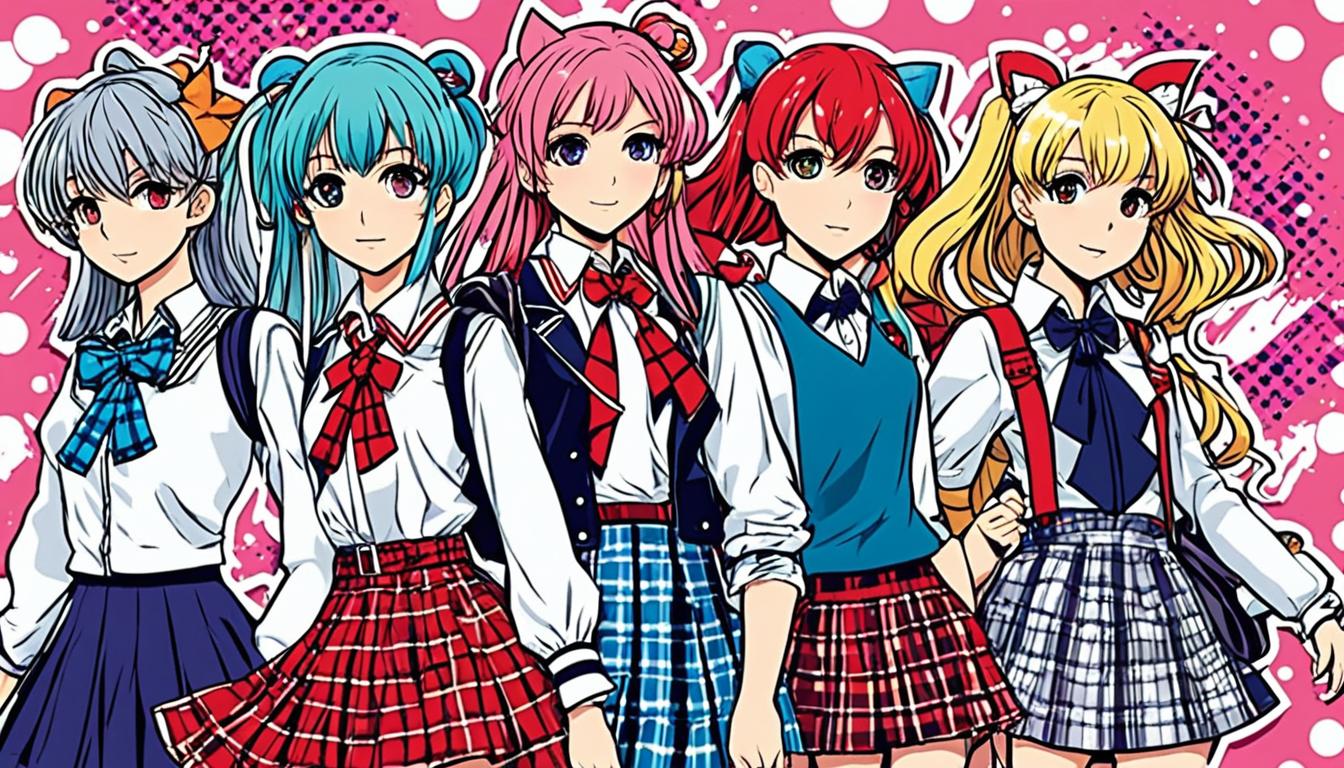Did you know otaku culture started in Japan and has grown to influence the fashion, anime, and gaming worlds? It began as a deep love for anime, manga, and video games. Now it includes idols, fashion, history, and niche hobbies.
Otaku fans don’t just watch or read. They actively partake in celebrating what they love. They enjoy going to special cafes. In these places, they find manga libraries, private booths, and even shower rooms for better experiences. Japan’s Akihabara district is a popular spot. It’s filled with stores that sell all kinds of things for otaku fans.
Key Takeaways:
- Otaku culture extends beyond a mere hobby and has become a lifestyle that influences fashion, anime, and gaming communities.
- Otaku enthusiasts actively shape and celebrate their fandoms, going beyond passive consumption.
- Specialized cafes and stores, particularly in Japan’s Akihabara district, cater to otaku culture, providing immersive experiences and a wide range of merchandise.
- Resources, such as conventions, themed cafes, and online communities, are available for individuals interested in exploring otaku culture.
- The term ‘otaku’ has evolved from a derogatory term to a celebration of passionate fans of various hobbies and interests.
Otaku Activities: A World of Fandom
In the Czech Republic, otaku culture is vibrant, with several conventions yearly. These gatherings bring together manga and anime fans, highlighting its popularity.
There are about 200,000 manga and anime lovers in the Czech Republic. Out of these, 10% are active otaku fans. These fans invest a lot in their hobbies, buying items like posters, figurines, and costumes.
For otaku fans, loving anime and manga is more than just a hobby. They become deeply connected with the characters, sharing in their emotions. They keep up with the latest releases and love watching series.
Specialized cafes are popular among otaku fans. Places like Icafe and Manga Cafe Iwakiya offer manga libraries and computer rooms, ideal for diving into their favorite worlds. It’s a great way for fans to relax and enjoy what they love.
Cosplay is a big deal in the otaku community. It’s about dressing up as favorite characters, whether they’re from Japanese or Western media. Fans show their creativity and dedication at events and conventions.
The otaku community in the Czech Republic is accepting and diverse. It welcomes people with different interests related to otaku culture. Conventions offer various activities, like lectures and competitions, bringing fans together.
To enhance their experience, otaku fans also go online. They join forums and social media groups to connect with others worldwide. The online community is key for sharing ideas and making friends.
Otaku Culture Statistics
| Fandom | Number of Fans (Japan) |
|---|---|
| Manga | 6.74 million |
| Anime | 6.57 million |
| Idols | 4.29 million |
The table above shows how popular manga, anime, and idols are in Japan. They have attracted millions of fans, showing the wide reach of otaku culture.
In summary, otaku culture offers a world of fandom for its enthusiasts. Whether it’s through visiting cafes, cosplay, or digital spaces, otaku fans can find joy and connection in their hobbies. The culture’s passion and creativity create a strong, global community.
Otagei: The Art of Fan Performance
Otagei is a big part of otaku culture. It’s a synchronized fan performance often seen at anime and idol concerts. Fans wave glow sticks and dance together to the music, making an exciting show. This lets fans interact with their favorite songs and support their beloved characters in a fun way.
More than 200 people went to a chika idol concert near Shinjuku station. Most fans were males in their 20s to 40s. This shows how much otagei performances are loved in the otaku community.
This kind of performance is more popular now and is also in anime, like Oshi no Ko. In Japan, groups like zerouchirestart are known for their otagei shows. They show a lot of talent and love for this kind of performance.
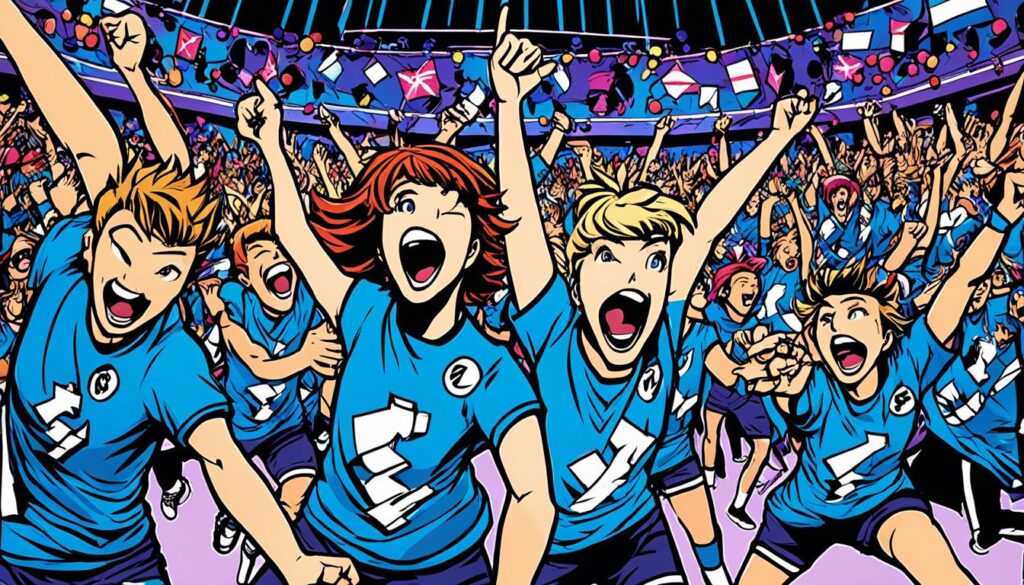
The enthusiasm of otaku culture comes out in otagei. Chika idols work a lot, doing multiple performances a day. They might talk with fans for a bit longer, giving a more personal touch for a price. This is different from typical idols who have very short interactions with fans.
The pay for a chika idol is about 130,000 yen a month on average. This shows they often need another job to support themselves. Even with their busy lives, otaku fans keep up their support through otagei.
Research shows about half of chika idols have had romantic relationships. This contrasts with the idealized image fans often have of them.
Otagei is closely tied to otaku culture. Terms like “ota gei” and “wota gei” describe fan dances at idol events. These dances are known for their special cheers and moves.
Statistics Related to Otagei:
| Research Topics | Relevance |
|---|---|
| Shifting discourse around music technologies in the early years | Provides insights into the historical context of otagei performances and their connection to the evolution of music technologies. |
| Anxiety around new technologies in music | Explores the tension and perceptions associated with the integration of new technologies into the music industry. |
| Reception history of two early techno-pop groups | Examines the reception and impact of early techno-pop groups in shaping the otaku culture and fan performance practices. |
| Anxieties about dehumanized music-making in the 1970s | Maps the anxieties surrounding the globalization of music production and the impact on fan culture. |
| Analysis of Vocaloid singing synthesis software | Explores the influence of Vocaloid software on fan culture and its contribution to the popularity of otagei performances. |
| Structured participation of fans at holographic concerts | Evaluates the role and impact of fan participation in holographic concerts, where technology blends with fan performance. |
Studies on otagei offer insight into its history and cultural impact. They show how it helps build community and allows for creativity and expression within the otaku world.
Vocabularies You Need To Know
To understand otaku culture, learning key terms is a must. Here’s a list of important words:
- Otaku: Fans, especially of anime and manga.
- Ani ota: It means “anime otaku,” describing someone who loves anime.
- Manga: Comics from Japan.
- Anime: Animated TV shows or movies from Japan.
- Gēmā: It’s the Japanese word for “gamer,” often used for game-loving otaku.
- Cosplay: Dressing up as characters from anime, manga, or games.
- Cosplayer: Someone who does cosplay, dressing up as characters.
- Ita baggu: It’s a decorated bag with a fan’s favorite character items on it.
- Dōjinshi: Self-made manga or novels sold at places like Comic Market (Komike).
- Otagei: High-energy dances and chanting by fans at live shows.
Getting to know these terms makes navigating otaku culture easier.
The Difference Between an Otaku and a Casual Fan
In the anime and manga world, there are otaku and casual fans. While they both love anime and manga, how they show it differs. It comes down to how much time and effort they put into their interest.
Otaku enrich their lives with anime and manga. They do more than just watch or read – they dive deep. Otaku fans keep up with new releases, attend conventions, and may even cosplay. Their knowledge and passion are clear to see.
Casual fans approach anime and manga more lightly. They enjoy their favorite series but not like an otaku. This group might not do cosplay, attend conventions, or collect much stuff related to their series. Their interaction with anime and manga is more on-and-off, which is okay.
Just because you’re a casual fan doesn’t mean you’re not a true fan. They still truly love the anime and manga world. Casual fans might have series they really like but don’t deep dive into like an otaku might. Their life outside this hobby might be busier, influencing how much they engage with it.
The big difference is how much otaku and casual fans commit. Otaku fans put a lot of time and energy into their interest. Casual fans enjoy the worlds created by anime and manga but at their own pace. With both groups, the anime and manga community stays colorful and alive, showcasing different ways to love the same thing.
Is Otaku Culture a Negative Stereotype?
Otaku culture used to face a lot of negative views. But now, many wear the title with pride. It’s really about passion, creativity, and finding a like-minded community. This culture offers a safe space to make connections, express love for specific things, and feel accepted.
Negative ideas about otaku culture are usually wrong. They don’t capture the true spirit of its diverse community. This group is full of life and creativity.
“Contrary to stereotypes, studies have shown that anime fan communities are highly social, with otaku gathering in groups of friends, college clubs, online forums, and at conventions.” – Anime Enthusiast Magazine
Otaku fans love to talk and share. They connect and exchange information on beloved series, collectibles, and news. This sharing is known as “thing-communication.” It creates a warm and supportive atmosphere for everyone to enjoy their interests.
The Comic Market (Comiket) convention is a highlight for otaku culture. It sees massive support, with 35,000 people attending twice a year. Here, the diversity and creativity of otaku fans shine through.
| Perception of Otaku Culture | Reality of Otaku Culture |
|---|---|
| The media portrays otaku as antisocial and detached from reality | Otaku culture values social interaction and community |
| Prefer an imaginary world over real-life interactions | Engage in “thing-communication” and actively share information with fellow enthusiasts |
| Seen as individuals who have trouble distinguishing between reality and fiction | Explore their passions through creativity and celebrate the things they love |
Tackling the negative views on otaku culture is important. By recognizing and celebrating its creativity and community, we can change perspectives. This refusal to accept false ideas makes us all appreciate otaku culture more.
To sum up, otaku culture is all about joy, creativity, and camaraderie. By looking past stereotypes and seeing the real otaku culture, we embrace something truly positive for everyone.
Otaku Culture: Unique and Mainstream in Japan
Otaku culture was once seen as a small interest. But now, it’s much more common in Japan. You can see its effects in many parts of Japanese life, like in movies, shows, and even the way people buy things. It isn’t just in Japan, though. People all over the world love otaku culture. This shows how much people around the globe are connected by their love of the same things.
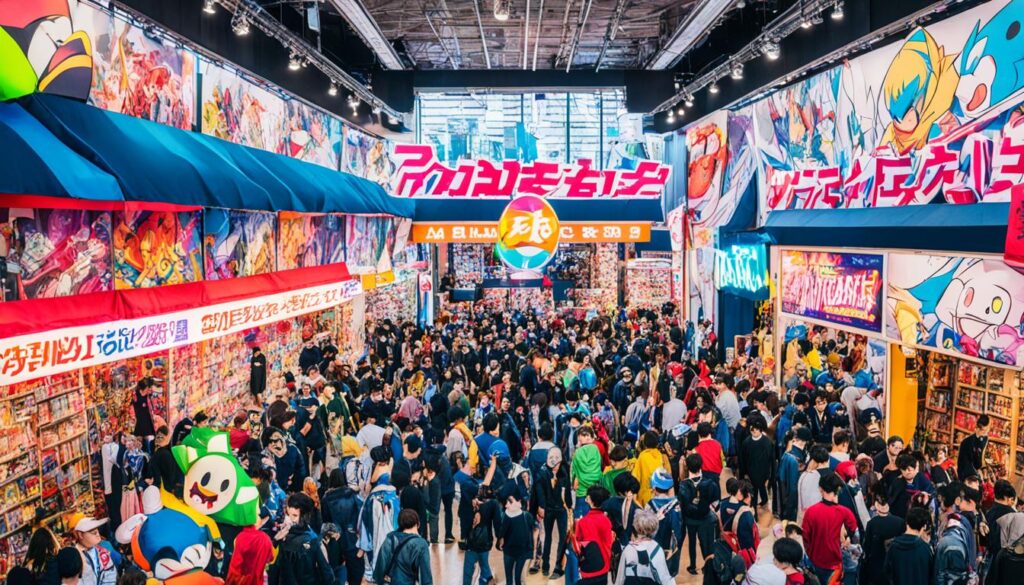
Why has otaku culture become so big in Japan? The media has played a huge role. Shows like Neon Genesis Evangelion, Attack on Titan, and One Piece are really popular thanks to otaku fans. These days, manga artists make stories that otaku readers love, such as Naruto, Berserk, and JoJo’s Bizarre Adventure
The world of otaku has many parts, like cosplay. Every year, people from all over visit Nagoya for the World Cosplay Summit. There’s also the ‘Idol Otaku’ group that follows Japanese pop idols. And don’t forget the ‘densha otaku,’ who love trains, and the ‘military otaku’ fascinated by war history and strategies.
There are big events for otaku fans to meet up, like Comiket and Anime Expo. Tokyo’s Akihabara district has also become famous as a mecca for otaku enthusiasts. It’s known around the world and helps keep Japan’s tourism business growing.
Today, otaku and mainstream society blend in Japan. This isn’t just about loving cool stuff. It shows how much people value art and culture. Otaku have changed from a small group to a big part of society. Their love for creativity has made a real mark on the world. Seeing otaku’s love spread helps unite people, showing we’re more alike than we think.
Otaku Enthusiasts: Beyond Age Categories
Otaku culture brings together people of all ages. It reaches across generations, from young teens to older adults. Everyone joins in on otaku activities, showing how welcoming and popular this subculture is.
Young people, like teenagers, are a big part of the otaku world. They love things like anime, manga, and games. They dress up as characters they admire, and they meet up at big events like the Tokyo Comic Con.
Grown-ups also love otaku hobbies. They spend a lot of time and money on this. They collect items and often visit shops in Japan, looking for unique finds. Plus, they don’t miss out on the big otaku events in the country.
Otaku culture goes beyond age categories, fostering a sense of belonging and community for individuals of all generations.
What’s great about otaku culture is how it brings people together. It’s not strange to see those in their thirties or older in online chats. They get to talk, work together, and share things about their otaku hobbies on these websites.
People of every age group like otaku things. From young teens to grown adults. Otaku activities make a place where everyone finds a friend and loves their shared hobbies.
Learning More About Otaku Culture
Want to know more about otaku culture? There are many ways to dive in. You can visit conventions, themed cafes, and join online groups. These spots are great for meeting others who share your interest.
Conventions: Tokyo Comic Con and Tokyo Game Show
Places like Tokyo Comic Con and Tokyo Game Show let you experience otaku culture first-hand. At these large events, you can meet other fans and pros. They also offer cool stuff to buy, cosplay shows, and talks.
Themed Cafes and Shops: Akihabara and Ikebukuro
Akihabara and Ikebukuro in Tokyo are top spots for themed cafes and shops. They’re hubs for otaku culture. In these areas, you’ll find cafes to enjoy manga and shops to get anime gear.
Online Communities, Forums, and Social Media Groups
Looking for online friends who love anime and manga as much as you do? Join forums, communities, and social media groups. You can chat with people worldwide about your favorite shows and find new recommendations.
Exploring these resources helps you understand otaku culture better. It’s a fun way to make friends, learn, and grow your love for this creative and passionate community.
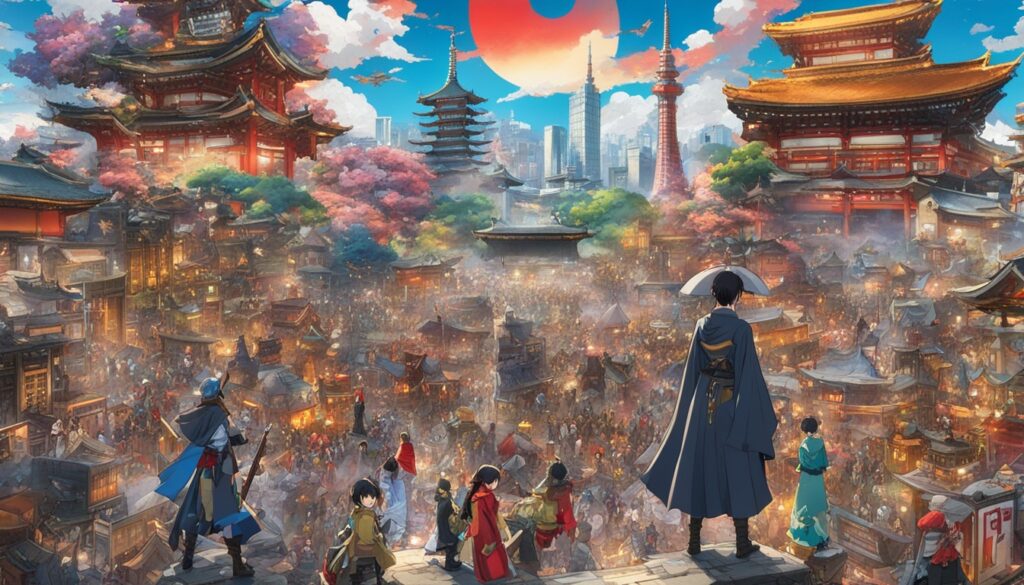
Being an Otaku in Japan and Abroad
Being an otaku in Japan and abroad is different. In Japan, they’re taken more seriously now. The country sees otaku as valuable to the economy and culture. This has made otaku culture known and liked by more people.
Internationally, otaku culture is growing too. Fans from all over the world now enjoy it. Together, they create a big and welcoming otaku community.
Japan started the otaku culture. It was once seen as a small, fringe interest. But, series like ‘Mobile Suit Gundam’ and ‘Neon Genesis Evangelion’ changed that. They showed the world the beauty of anime.
The change in how Japan sees otaku started in the late 1990s. A new group, ‘light otaku,’ appeared. They enjoy otaku hobbies without getting too obsessed. This made otaku culture in Japan more diverse and accepted.
Worldwide, otaku culture is very popular. Fans from every corner of the globe support it. Famous anime like ‘Dragon Ball’ and ‘Sailor Moon’ are loved by people everywhere. They have a big part in global culture.
Even though some people still don’t get otaku culture, the community remains strong. They share their love for otaku despite any negative views. This shows the world how powerful shared interests can be.
Otaku culture is also a big deal for the economy. Fans buy a lot, from video games to collectibles. This supports Japan’s entertainment business a lot. The government noticed this and now supports spreading Japanese culture worldwide with the ‘Cool Japan’ plan.
In the end, being an otaku is both hard and fun. The otaku community is worldwide now. It connects people, influences culture, and helps the economy grow.
Jump to Table of Content
Quote:
“*Otaku culture knows no borders.* Despite different languages and cultural backgrounds, otaku enthusiasts around the world find camaraderie in their shared love for anime, manga, and gaming. It’s a testament to the power of these passions to bring people together.” – Anonymous
| Country/Region | Percentage of Self-Identified Otaku |
|---|---|
| Japan | 62% |
| United States | 45% |
| South Korea | 38% |
| China | 52% |
| Brazil | 28% |
Otaku Culture: Its Economic Influence
Otaku culture is big in Japan and around the world. In 2004, it made about $4 billion. This includes things like anime, manga, and games.
Anime and manga alone make over $900 million. Fans buy a lot of stuff, like DVDs and action figures. This really helps the entertainment industry and creates jobs.
Conventions like Comiket are very important. They make money from tickets and sales. Fans come together to celebrate their favorite shows and comics.
Otaku culture has a huge effect on tourism too. Akihabara in Tokyo is a top spot for fans. People from all over the world visit to see the culture and buy merchandise.
The Japanese government supports these cultural exports. They want to share Japan’s creativity with the world. The ‘Cool Japan’ project helps promote things like anime and manga globally.
By 2030, there could be over 30 million otaku in Japan. This would be almost 40% of the population. Their spending helps many different industries.
Otaku culture boosts Japan’s creative scene and economy. Fans’ love keeps it growing, making it a key player in media and art.
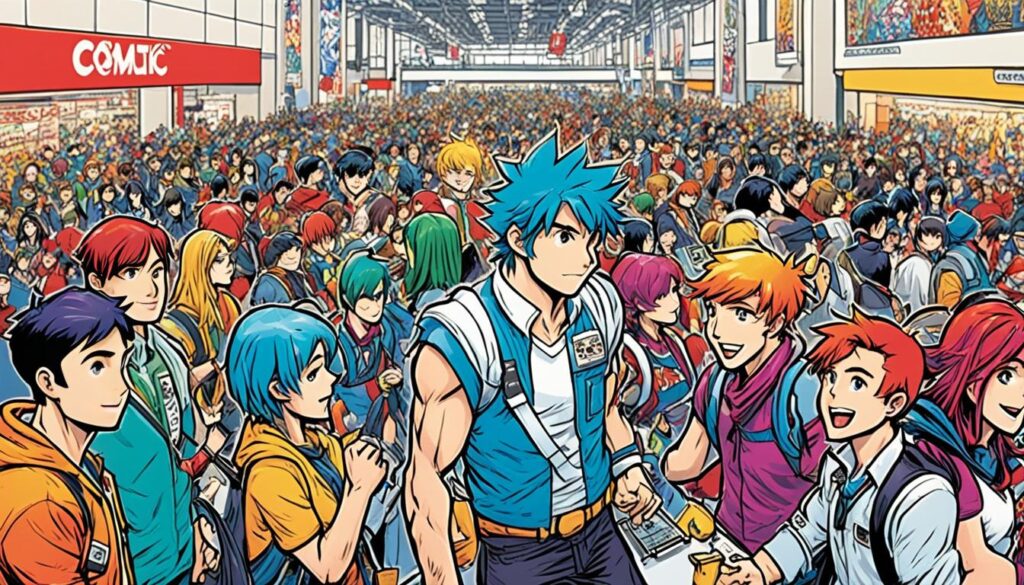
| Statistics | Japan | Czech Republic |
|---|---|---|
| Total Population | About 17 million (2021) | N/A |
| Predicted Future Otaku Population (2030) | More than 30 million people, close to 40% of the total population | N/A |
| Estimated Otaku Market Size (2030) | Approximately 957.6 billion yen | N/A |
| Akihabara | ‘Mecca’ of Otaku culture, attracts tourists worldwide | N/A |
| Anime and Manga Market Value | More than $900 million | N/A |
| Contributions to Japanese Economy | Supports various industries such as product sales, content creation, events, conventions, and tourism | N/A |
The Evolution of the Term “Otaku”
The word “otaku” has a long and changing history. It was first seen in 1983 in the magazine Manga Burikko by Akio Nakamori. In 1989, it became more famous because of Tsutomu Miyazaki. He was in the news for terrible crimes, and media linked him to otaku culture, giving the term a bad name. Still, many fans now feel proud to call themselves otaku, changing its meaning over time.
The Meaning and Significance of “Otaku”
The term “otaku” is very important in Japan and all over the world. It shows a passion for certain anime and manga. “Otaku” is originally a Japanese word. It means someone who is very into a particular subject, like anime or manga.
As time went on, the word broadened its meaning. It now includes people who love anime and manga so much. It is not a common word in Japan. But it is loved by those who are passionate about geek and nerd cultures, worldwide.
The word “otaku” speaks to the change in Japanese society. It shows how anime and manga have captured people’s hearts worldwide. People who are “otaku” are known for spending a lot of time and money on their hobbies.
What being an “otaku” means has changed with time. Before, it was used to criticize someone who was too into one thing. People thought that they might not have been very social. But now, this word is used in a fun way by some.
In the past few years, the otaku culture has grown and become more normal. It is a big part of society in Japan and in other countries. Otaku fans have a strong and creative community. They connect and enjoy their hobbies together.
So, “otaku” is more than just a word. It shows how people from all over feel connected through anime, manga, and similar hobbies.
The Role of Otaku in Japanese Society
Otaku enthusiasts have a big impact on Japan, shaping its pop culture. Since the 1970s and 1980s, they’ve become a key part of society. There are at least 100,000 hardcore otaku, showing their influence and importance.
In the 1970s, Studio Nue started making anime, helping to spread the term “otaku.” This term became more popular among fans after 1989. That year, otaku culture also began to be widely recognized and accepted.
In 1989, the arrest of Miyazaki Tsutomu, the “otaku murderer,” led to more criticism. People started to link otaku with dangerous and socially disturbed behavior. This brought attention to a negative side of otaku culture.
Since the 1980s, otaku’s biggest love has been manga and anime. They’ve shaped these art forms through their deep passion. Their interest in these creative realms has made a lasting impact on the content and direction of anime and manga.
By the start of the new millennium, otaku culture focused more on sex. This led to the rise of gyaru-ge and more female characters in anime and manga. As time went on, otaku’s interests changed. This shows how otaku culture has moved and grown over the years.
Otaku fans play a big part in Japan’s economy by buying anime and manga. In 2005, their spending was estimated to be as much as ¥2 trillion (US$18 billion). Their impact on the economy is huge.
Over the years, otaku culture has become more widely accepted in Japan. It’s now a significant part of society. Otaku’s role in shaping culture and economy is clear. They have made valuable contributions.
Otaku fans have built a lively global community based on their shared love. Anime, manga, and games connect fans worldwide. People from different cultures and backgrounds come together through this common interest.
Otaku are vital to Japanese society and global pop culture. Their passion spurs industry growth and creativity. They strengthen the sense of community among fans. It’s important to recognize their positive impact.
Conclusion
Being part of otaku culture is more than a simple hobby. It’s a lively subculture that affects fashion, anime, and games. It’s about more than just watching or playing. It’s a way for people to come together. To show who they are and share what they love.
Even though otaku culture was once looked down on, now it’s more accepted. This is true both in Japan and worldwide. It also plays a big part in the economy. It helps many different businesses grow.
Otaku culture stands out because of how passionate and creative its followers are. They prove that sharing those interests can create a strong community. These people meet at conventions, themed cafes, and online to share their love. Otaku culture is a deep form of showing dedication and affection for what you enjoy.
By being part of otaku culture, you find a way to show who you are. And you get to enjoy the many benefits of having friends with similar interests. This way of life can help lower stress and boost creative skills. It adds positivity to your life.
If you love anime, manga, games, or any other otaku interest, be proud. Join with others who share your passion. Together, you can make otaku culture even better.
FAQ
What is otaku culture?
Otaku culture has grown into a lifestyle that shapes fashion, anime, and gaming. It’s for people with a strong interest in anime, manga, video games, and tech.
What activities are associated with otaku culture?
Otaku fans do things like keep up with new anime, go to unique cafes, and wear costumes of their favorite characters. They also collect a lot of anime stuff and join groups online. This makes otaku culture very social and interactive.
What is otagei?
Otagei is a kind of fan performance seen at anime and idol shows. Fans wave glow sticks and dance to anime songs together. This creates a fun and supportive environment for their favorite characters.
What are some key terms related to otaku culture?
Key terms include otaku (fans), manga (comic books), anime (animated shows), cosplayer (costume player), and doujinshi (self-published works). These terms are central to otaku culture and events like Comic Market.
What is the difference between an otaku and a casual fan?
The big difference is how much time and effort they put in. A casual fan enjoys these things occasionally. But an otaku spends a lot of time and energy on their interests, actively taking part in the community.
Is otaku culture a negative stereotype?
Otaku culture itself is not bad. It’s all about passion, creativity, and making friends. Any bad ideas are usually wrong and don’t show the real otaku community.
Is otaku culture mainstream in Japan?
Yes, otaku culture is becoming very popular in Japan and around the world. It’s a big part of entertainment and the economy. While it’s known worldwide, it stays strong in Japan’s cultural and artistic scene.
What age groups are involved in otaku culture?
Anyone, from teenagers to seniors, can enjoy otaku culture. People of all ages join events and online communities. This makes otaku culture welcoming to everyone.
Where can I learn more about otaku culture?
You can learn a lot by going to conventions, cafes, and shops. Also, you can find tons of information in online groups and forums. These places let you share and gain knowledge with other fans.
How is otaku culture viewed in Japan and abroad?
In Japan, being an otaku is seen more positively today. Their impact on the economy is recognized. Around the world, people love otaku culture, celebrating it together.
What is the economic influence of otaku culture?
The otaku market is huge, making billions. This includes anime, manga, games, and merchandise. Fans’ spending and support fuel the industry’s growth.
What is the history and significance of the term “otaku”?
The word was first used in 1983 and became famous in 1989 because of a crime. But, fans changed its meaning to show pride in their geek culture.
What is the meaning and significance of “otaku” in Japanese culture?
“Otaku” in Japanese mixes the word for home with an honorific. It used to just mean someone who loves anime and manga. But it shows changing ideas in Japanese society too.
What role do otaku enthusiasts play in Japanese society?
Otaku fans affect everything from fashion to art in Japan. Their spending and activities help the economy and show the value of passion and community
